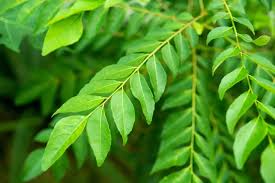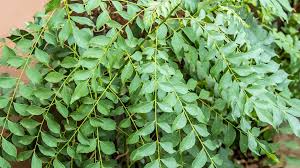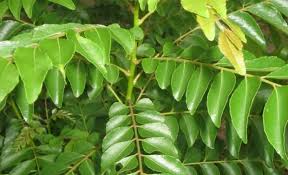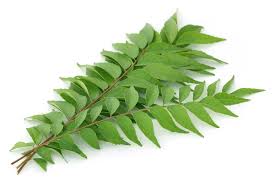Page Contents
ToggleCurry leaf, a staple in South Asian cuisine, is derived from the curry tree (Murraya koenigii), a plant native to India and Sri Lanka. Known for its aromatic properties and distinctive flavor, curry leaf plays a vital role in culinary traditions, particularly in Indian, Sri Lankan, and Southeast Asian dishes. Beyond its culinary applications, curry leaf has been celebrated for its medicinal and cultural importance for centuries.
The leaves are small, green, and glossy with a slightly curved shape. Their pungent yet subtle aroma and earthy taste make them an indispensable ingredient in spice blends, curries, and chutneys. Over time, the popularity of curry leaves has expanded worldwide, and they are now cultivated and used globally.
Nutritional Profile of Curry Leaf

Curry leaf is packed with essential nutrients that contribute to its status as a superfood:
- Vitamins: Rich in vitamin A for vision health, vitamin C for immunity, and vitamin E for skin and hair health.
- Minerals: Contains calcium, iron, phosphorus, and magnesium, which support bone strength and metabolic functions.
- Antioxidants: Loaded with flavonoids, alkaloids, and phenolic compounds that combat oxidative stress.
- Dietary Fiber: Aids digestion and promotes gut health.
- Essential Oils: The presence of linoleic acid and cinnamaldehyde provides anti-inflammatory and antimicrobial benefits.
Health Benefits of Curry Leaf
- Promotes Digestive Health
Curry leaves are known for their ability to support the digestive system. They stimulate digestive enzymes, helping to break down food more efficiently. Additionally, they have mild laxative properties, which can alleviate constipation and promote regular bowel movements. - Supports Heart Health
The antioxidants in curry leaves help lower cholesterol levels, reducing the risk of heart disease. They also support healthy blood pressure levels and improve circulation, contributing to overall cardiovascular health. - Enhances Immune System
Rich in vitamin C and other phytonutrients, curry leaves bolster the immune system, making the body more resistant to infections and illnesses. Their antibacterial and antifungal properties help combat pathogens. - Regulates Blood Sugar Levels
Curry leaves are often recommended for individuals with diabetes. They contain compounds that improve insulin function and regulate blood sugar levels. Regular consumption of curry leaves may also help prevent diabetes-related complications. - Improves Eye Health
The high content of vitamin A in curry leaves supports vision health and helps prevent conditions such as night blindness and dry eyes. The antioxidants also protect the eyes from oxidative damage. - Supports Hair and Scalp Health
Curry leaves are a traditional remedy for promoting hair growth and reducing hair fall. They strengthen hair follicles, prevent dandruff, and enhance the overall texture of hair. Curry leaf oil or hair masks are commonly used for scalp health. - Detoxifies the Body
Curry leaves act as a natural detoxifier, cleansing the liver and kidneys. They help eliminate toxins and improve organ function, supporting overall health and vitality.
Culinary Uses of Curry Leaf

- Essential Ingredient in South Asian Cuisine
Curry leaves are a cornerstone of South Asian cooking, especially in Indian dishes. They are often sautéed in oil or ghee to release their aroma before being added to curries, dals, and sambars. - Flavor Enhancer in Rice Dishes
Curry leaves add depth and flavor to rice dishes such as lemon rice, coconut rice, and biryanis. Their aroma complements the spices and elevates the dish’s overall profile. - Used in Spice Blends
Dried curry leaves are ground into powders and used in spice blends like sambar powder and curry masala. These blends are essential for seasoning various dishes. - Infused in Chutneys and Sauces
Curry leaves are often blended into chutneys, providing a fresh and zesty flavor. They are also infused in sauces to enhance their taste and aroma. - Topping for Snacks and Savory Delights
In South Indian snacks like dosa, idli, and vada, curry leaves are added as a garnish or mixed into the batter for an added burst of flavor.
Traditional Medicinal Uses of Curry Leaf
- Remedy for Nausea and Indigestion
Chewing fresh curry leaves or drinking curry leaf tea is a common remedy for nausea and indigestion. The leaves help soothe the stomach and improve digestion. - Treatment for Anemia
The high iron content in curry leaves makes them an effective remedy for anemia. Consuming curry leaves regularly can boost hemoglobin levels and improve energy. - Supports Weight Loss
Curry leaves are believed to support weight loss by reducing fat accumulation and improving metabolism. They are often included in detox drinks or teas for their fat-burning properties. - Improves Oral Health
Curry leaves have antibacterial properties that support oral hygiene. Chewing fresh leaves can help reduce bad breath and prevent gum infections. - Relieves Skin Conditions
Curry leaves are used in traditional medicine to treat minor skin conditions such as rashes, burns, and infections. They soothe inflammation and promote faster healing.
Skincare and Beauty Benefits of Curry Leaf

- Promotes Radiant Skin
The antioxidants in curry leaves protect the skin from damage caused by free radicals, reducing signs of aging such as wrinkles and fine lines. Curry leaf paste can be applied topically for a natural glow. - Reduces Acne and Blemishes
Curry leaves have antibacterial properties that combat acne-causing bacteria. Using curry leaf-infused water or applying curry leaf paste helps clear the skin. - Strengthens Hair and Reduces Hair Loss
Curry leaves are widely used in hair care routines to strengthen hair follicles and reduce hair loss. Curry leaf oil, prepared by infusing leaves in coconut oil, is a popular remedy for scalp health and hair growth. - Home and Everyday Uses of Curry Leaf
- Natural Air Freshener
Curry leaves, when dried and placed in a bowl, can act as a natural air freshener, adding a subtle, earthy aroma to living spaces. - Insect Repellent
The essential oils in curry leaves act as a natural insect repellent. Placing fresh or dried leaves near windows and doors can help keep pests away. - Composting and Gardening
Used curry leaves can be added to compost, enriching the soil with nutrients. They also act as a natural fertilizer for plants. - Infusion for Relaxation
Curry leaf tea is a calming beverage that helps reduce stress and anxiety. Its soothing properties make it an excellent choice for unwinding after a long day. - Growing and Harvesting Curry Leaf
Curry trees are easy to grow and care for, making partaitogel them a popular choice for home gardens:
- Planting: Curry trees thrive in well-drained soil and sunny locations. They can be grown in pots or garden beds.
- Caring: Regular watering and occasional pruning help maintain the tree’s health and shape.
- Harvesting: Leaves can be plucked year-round. Fresh leaves are ideal for cooking, while dried leaves can be stored for later use.
Precautions and Side Effects of Curry Leaf
While curry leaves are generally safe, a few precautions should be observed:
- Allergic Reactions: Rare cases of allergies to curry leaves have been reported. Conduct a patch test before using topically.
- Medication Interactions: Curry leaves may interact with certain medications for diabetes or hypertension. Consult a healthcare provider if unsure.
- Excessive Consumption: Overeating curry leaves may cause mild digestive discomfort in some individuals.
Role of Curry Leaf in Modern Industries
- Food and Beverage Industry
Curry leaves are used in ready-to-cook meals, spice mixes, and snack flavorings. They are also gaining popularity in health drinks and herbal teas. - Skincare and Cosmetics
Curry leaf extracts are incorporated into creams, lotions, and shampoos for their skin and hair benefits. - Pharmaceuticals
Curry leaves are studied for their potential in developing herbal medicines for diabetes, inflammation, and other conditions.
Conclusion
Curry leaf is a remarkable herb with a plethora of health benefits, culinary applications, and traditional uses. Its rich nutritional profile and medicinal properties make it an essential addition to daily life. Whether incorporated into cooking, beauty routines, or wellness practices, curry leaves bring a unique blend of flavor, aroma, and health-enhancing properties to the table.



